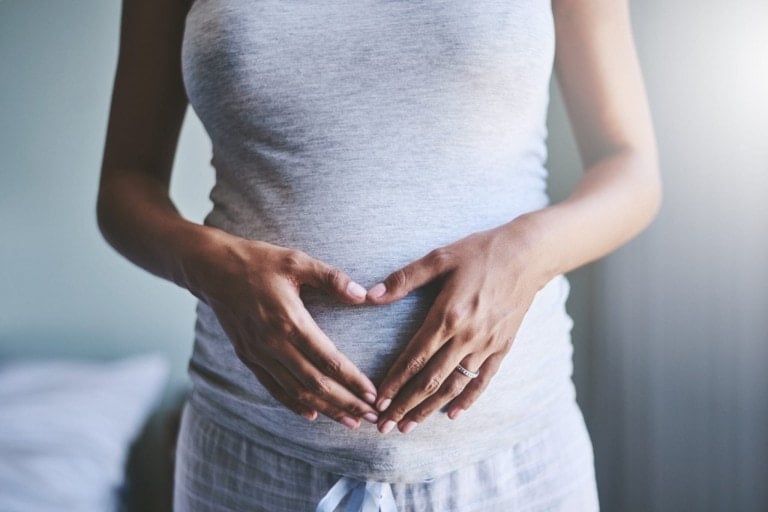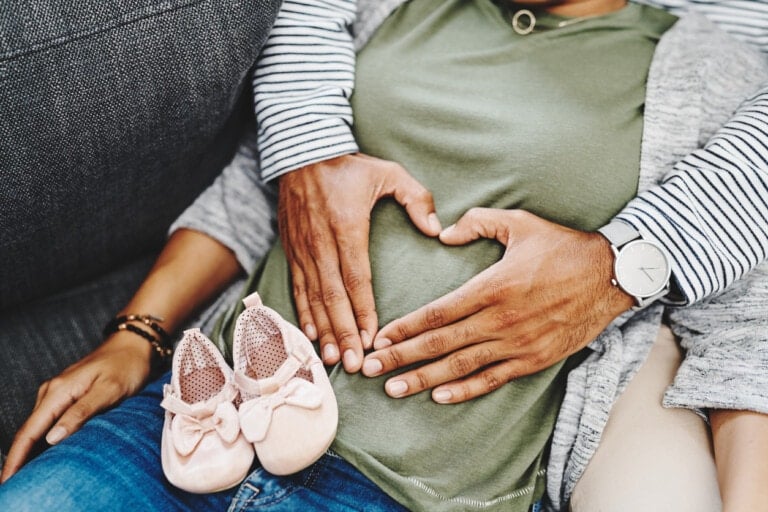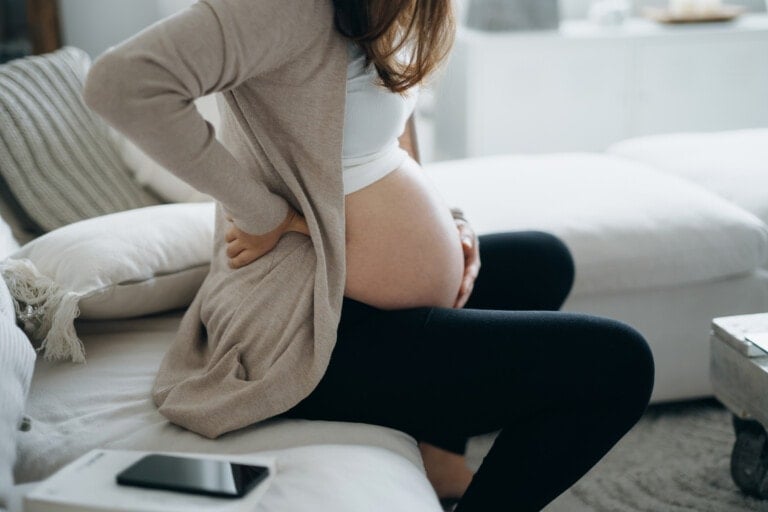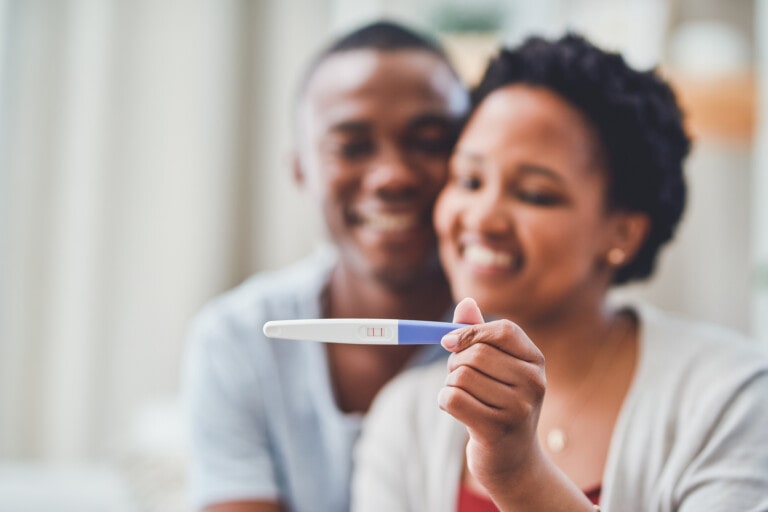Your first trimester of pregnancy can be an uncertain yet exciting time. Even if you have been through a pregnancy, you may have forgotten (or blocked out!) what early pregnancy is like. Your body is going through so much change as it grows and prepares to accommodate a baby inside you. At the same time, your emotions in your first trimester are rampant due to hormones and the sheer shock at the news that your life is about to change forever.
Whether this is your first or fifth pregnancy, we all experience a new one differently. Despite varying sensations, there are many common symptoms, emotions, and habits many women report in the first trimester. If you have been looking for something to relate to or a list of what to expect from early pregnancy, look no further!
19 Signs You’re in the First Trimester of Pregnancy
You know you’re in your first trimester when…
1. You Scroll the Internet for Common Pregnancy Symptoms
If you are reading this, you have probably queried first trimester symptoms. You might be looking for reassurance that you are pregnant enough to experience symptoms. Or you want to know that what you are experiencing is related to pregnancy and your first trimester. Otherwise, you might need a heads-up on what you should expect in the coming months. Virtually every pregnant woman I have ever known looks this up at some point in early pregnancy.
2. You Buy Every Pregnancy Book You Can Find
Searching for pregnancy books results in thousands of options. These include week-by-week pregnancy roadmaps, birth guides, books for partners, and parenting manuals. As a newly pregnant mom, you want all the information possible. When I was newly pregnant with our first baby, I definitely ordered more books than we could ever read before the baby arrived. A better approach might be to choose specific topics you want to learn more about. Then, select one or two books with good reviews or recommendations.
3. Everything Makes You Cry
Anyone who just received shocking or life-altering news is expected to be more emotional than usual. Adding a new baby to the family certainly qualifies. Add in the fact that this change is happening inside your body, and you may experience a whirlwind of emotions. The hormones in early pregnancy do not help the emotional instability either, especially in your first trimester. While the tearfulness may make you feel like you are going crazy, this is a very typical symptom of pregnancy.1 Try to ride the waves and if needed, explain to your partner that you may need a bit more sympathy, grace, and understanding right now.
4. You’re Constantly Looking Forward to Your Next Appointment to Make Sure You’re Still Pregnant
Without much of a baby bump or being able to feel the baby move, it can be easy to doubt or forget you are actually pregnant. Doctor’s appointments and ultrasounds in the first trimester can reassure you that you are pregnant and everything is going right. There is really a baby growing in there, even though you may not be able to see or feel them yet.
5. You Suddenly Need a Daily Nap
Your body uses a lot of energy to nourish your baby, grow your placenta, and stretch your womb. All that work can be exhausting, and your body may be screaming for extra rest. Get it when you can, whether you go to bed earlier, sleep in later, or sneak in a mid-day nap.
6. Your Online Workouts Are Sending “We Miss You” Emails
When you struggle to stay awake for the whole day, it can feel impossible to squeeze a workout in. Most providers say it is safe to continue most workout regimens you were doing before becoming pregnant. However, many women still fall away from pre-pregnancy exercise routines during their first trimester. This can happen because your energy is lacking, and your nausea is limiting. Take it easy on yourself and if you’re up for it, try to get your blood flowing with a light walk. Your energy will return when your body is ready to take on those workouts again.
7. You Get Full From Just a Few Bites
While your hunger may have increased, you may find that you cannot eat as much as you could before pregnancy. This is due to a typical pregnancy phenomenon. Your stomach holds onto food longer and empties its contents into your intestines much more slowly. The hormone progesterone, which peaks in the first trimester, relaxes your stomach muscles and slows down digestion.2 Maybe your body is telling you to eat small, frequent snacks instead of large meals. This will keep you fueled throughout the day without feeling full and may also help your morning sickness.
8. You’re Annoyed at the Term “Morning Sickness”
A common symptom of pregnancy, nausea, and vomiting is no secret. However, “morning sickness” is a bit of a misnomer because the nausea doesn’t always stop after the morning. For many women, it can last all day. Increased pregnancy hormone levels are thought to cause this unpleasant symptom, but fortunately, most women experience relief once these hormones level out in the second trimester. It may also be reassuring to know that pregnancy nausea and vomiting rarely affect the nutrition of the mother or the growing baby.3 Your provider may suggest small, frequent snacks, ginger ale, and perhaps even certain medications depending on the severity of your symptoms.4
9. You Stock Your Pantry and Freezer With Carbs
Another common first-trimester symptom is food aversions and, along with that: food cravings. Many women report that simple carbohydrates, like bread and bagels, are all they can stomach in the first trimester. I craved potatoes in my first trimester—fries, chips, mashed or baked potatoes—any form would satisfy. The first trimester is often likened to “survival mode,” so eat what you can tolerate. Your body will divert the essential nutrients to the baby, and you will crave the nutrients you need.
10. Your Breasts Are So Sore
Changes in the breasts are one of the first signs of pregnancy, often causing tenderness and pain. The hormone progesterone rises rapidly in early pregnancy and causes the breasts to swell. It also causes the areola to darken in preparation for eventual lactation. Because of the rapid growth of the breasts in early pregnancy, women can experience itchy skin and stretch marks, and not just on their bellies! Many health professionals believe pregnancy and breastfeeding are the final maturation of the breasts.5 Perhaps this is why many women report decreased breast pain in subsequent pregnancies compared to their first. As uncomfortable as the breast tenderness is, breast pain may signify your hormone levels are likely where they should be. Investing in larger or more comfortable bras may make this symptom more bearable.
11. You’re Constipated Like Never Before
As your uterus grows within your pelvis and lower abdomen, it increases pressure on your rectum. At the same time, the same hormone (progesterone) that slows your stomach emptying in the first trimester also slows down your intestinal muscles. This combination of factors can cause severe constipation in some women.6 Increased water intake, fiber, and exercise can help move those bowels. Be sure to check with your provider before trying any home remedies, stool softeners, or laxatives, as they are not all safe during pregnancy.
12. You’re Peeing Every 30 Minutes
In addition to the pressure your growing uterus is putting on your rectum, it is also putting pressure on your bladder. There is only so much room in your pelvis, so your bladder does not have much space. This causes frequent urination, as it cannot hold much at a time. Do not let this be your excuse to cut back on the water, as hydration is essential in the first trimester. Once your uterus grows a bit more and lifts up out of your pelvis in the second trimester, this symptom may improve.
13. You Have Trouble Differentiating Baby Bump From Bloating
Bloating is another fun pregnancy symptom that rears its ugly head in the first trimester. Like fullness and constipation, bloating and gas are caused by progesterone slowing down the movement in the intestines.6 Many first-trimester women feel that their bloating builds up throughout the day, and their abdomens are bulging with gas and fullness by evening. It can be hard at this stage to differentiate bloating from a baby bump.
14. You’ve Never Been So Happy to Feel Sick
Most early pregnancy symptoms, from gastrointestinal distress to breast pain, are not the most pleasant. Despite the discomfort you are likely experiencing, you are probably also feeling reassured that you feel what nearly every pregnant woman who came before you felt. During my pregnancies, while a day off from morning sickness was a welcome relief physically, I also became more anxious on those days about why I wasn’t feeling symptoms.
15. You Wonder Whether It’s Too Early to Start Buying Things for the Baby
In the first trimester, the newness of pregnancy has not yet worn off, and neither has the excitement. It can be tempting to buy everything you need while you are still so eager. There is a fine line between making wise purchases early and having the entire nursery ready at just 12 weeks pregnant. Save some items for registry gifts, but don’t hold back from a good sale just because you are early in your pregnancy. Just make sure to check the return policy.
16. You Use Coffee Shop Apps to Calculate Caffeine Intake
Most OBGYNs recommend cutting caffeine intake to around 200 mg daily during pregnancy.7 Depending on how strong you like your coffee, this equates to about two six-ounce cups. Many popular coffee shop apps report the caffeine content of their beverages. It can be easy to get sucked into calculating your exact intake and limits. Stick to a cup or two daily, or switch to decaf for peace of mind, but try not to obsess over this. After all, the data linking light to moderate caffeine intake to pregnancy outcomes is limited.
17. You Search for Foods Allowed in Pregnancy but Still Satisfy Your Cravings
Why does it feel like you constantly crave the things you cannot have in pregnancy? I never wanted a cold-cut turkey sandwich more than I did in my first trimester when I could not have it due to listeria concerns. Whether you like raw sushi, rare steak, runny eggs, unpasteurized cheese, or lunch meat, you are probably trying to find a way to satisfy these cravings while following the “rules.” Many of these foods can be consumed if you heat them appropriately to kill harmful bacteria, but sometimes it isn’t the same.8 Talk to your doctor about what is safe for consumption, and do your best to find ways to eat the things that sound good to you safely.
18. Everyone Wonders Why You’re Not Drinking
Another thing you cannot have during pregnancy is alcohol—no amount is considered safe.8 If you typically enjoy a drink or two with friends, not indulging can be a telltale sign that you are pregnant. This can be frustrating if you have social events with alcohol involved before you might be ready to tell people you are expecting. Try coming up with a plan ahead of time for pretending to drink or having another excuse. People may suspect anyway, but hopefully, no one will call you out or say anything before you are ready to announce.
19. Looking up Old Wives’ Tales to Guess the Gender
Unless you opt for early genetic blood testing, it is too early to tell your baby’s sex during the first trimester. There are Chinese gender calendar charts and predictors and old wives’ tales to predict baby’s gender related to everything from the different symptoms you are experiencing to the baby’s orientation and placenta in your ultrasound to the foods you are craving. While it can be fun to guess, these theories have no scientific backing. Every single wives’ tale told me my first child was a boy, and I ended up with a girl! You will know soon enough, and in the meantime, keep guessing.
The first trimester can be overwhelming emotionally and physically. You are excited to be pregnant but apprehensive to share that excitement with people too soon. You’re suffering physically and struggling with the seemingly endless rules and things you cannot do in pregnancy. Try to find comfort that the not-so-fun symptoms you are experiencing are likely signs that everything is going right. Know that this is all temporary. As you progress to the second trimester and beyond, you get used to the dietary restrictions, and you will no longer have to hide your pregnancy from friends and family. You also start to feel better and mentally adjust to the idea of a new baby. In the meantime, find camaraderie here and with other first trimester mamas!































